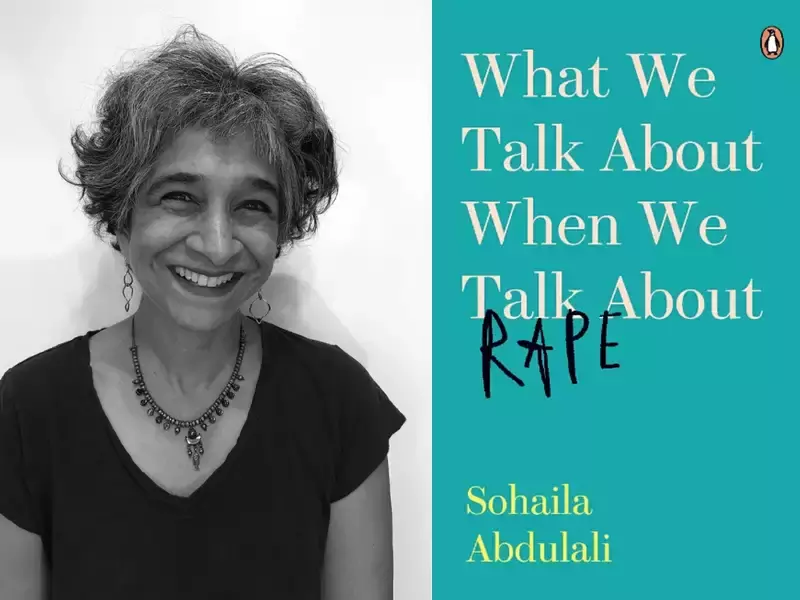'What We Talk About When We Talk About Rape' : Countering Rape Stereotypes
Surbhi Karwa
19 April 2020 11:43 AM IST

"These (rape) are crimes against the body of a woman which is her own temple. These are offences which suffocate the breath of life and sully the reputation. And reputation, needless to emphasise, is the richest jewel one can conceive of in life. No one would allow it to be extinguished. When a human frame is defiled, the "purest treasure", is lost. .....There cannot be a compromise or settlement as it would be against her honour which matters the most. It is sacrosanct............."
"I must be missing the Shame Gene that other Indian women are born with, because, for all the guilt, horror, trauma and confusion that followed my rape, it never occurred to me that I had anything to be ashamed of...."[2]
The above mentioned first paragraph is from the 2015 decision of the Supreme Court whereby the court observes that a women's body is her 'temple', her reputation is her 'richest jewel', which she will 'never allow to be extinguished' and that her honour is her 'purest treasure'. On the other hand, the second statement is statement by Sohaila Abdulali about her own rape, squarely rejecting the notions of honour and shame furthered by the Supreme Court. And this is precisely the hallmark of the book 'What We Talk About, When We Talk About Rape' by Sohaila Abdulali- countering every stereotype about rape, rape survivors and rape convicts.
Historically, law defined rape as a property offence against the husband or the father, not an offence against the woman herself. And over the centuries, law and legal system have continued to construct a propertied and patriarchal understanding about rape, rape victims and rape offenders. But as Sohaila writes is her book- "Except for the foundational belief that rape is a crime with a criminal and a victim, I will not take anything else for granted."
This is the primary reason why I believe that this book is a must for libraries of judicial academies and bar associations. It is only when lawyers and judges would actively engage in moving beyond these stereotypes that they would understand the survivor and her violation in its own different experience and work towards ensuring justice to her.
Rape Adjudication and Stereotypes-
There are range of stereotypes and myths about a typical rape victim in our legal system, listing which is beyond space of this article. Suffice is to say that in the rape trials in Indian courts, both construction of legal concept of 'consent' and actual proof of consent by a woman in any given case have been based on stereotypical understanding of rape victims.
And that is the problem. Stereotypes are not truth. There are no 'typical' behaviours and reactions for women. Each woman's reaction to her violation and her behaviour for handling the same may vary. A woman may physical resist her violation or she may not. She may be numb or she may choose to not resist to protect herself from further harm. As Sohaila write in her chapter on consent, 'Yes, No, Maybe'-
"I had four men with weapons threatening to kill both me and someone I loved. They made him drop his pants, held a knife to him, and said they would castrate him and kill us both if I didn't stop fighting. So I did. I "let" them rape me. I "chose" rape over death.
This is brilliance of this book. Chapter after chapter, by telling stories, experiences of her own rape and various rape survivors, Sohaila questions each of the stereotypes which over the years have negatively impacted fair trial and justice for survivors of rape in this country.
Psychological Impacts on Rape Survivors-
At the heart of these stereotypes lies the lack of understanding amongst judges and lawyers about psychological impact of rape on surviors. Judges and lawyers alike are yet to fully appreciate and understand the same. For instance, it is one of the most common rape myths that a genuine rape victim immediately reports her violation and yet in a rape trial, delay in registration of FIR is seen as fatal to prosecution. Sexual violation can leave the victim with range of emotional psychological traumas- feeling dirty, feeling used-up, useless, feeling broken, shame, loss of control, PTSD etc. The book gives nuanced account of these psychological reasons. Through her own example, she shares how after years of her abuse, wearing a scarf around neck is still difficult for her. Why did she not report early- a question is often heard in rape trials. The book is the answer why.
'Othering' of Rape Convicts-
Similar to having stereotypical notions of rape victims, the legal system also has stereotypical understanding of 'who rapes'. This is why standard imagination of rape is rape by a brutal stranger despite majority of cases of rape being cases related to rape by an acquaintance.
We as a society indulge in 'othering' the rape convicts by continuously referring to them as 'monsters', 'beasts', 'from another world' in court documents, in court proceedings. It is by this othering that we, as a society abdicate our responsibilities towards the rape convicts and see quick revenge in form of death penalty as answer. The book questions this 'othering' and shows us that rape accused are product of our own society and patriarchal culture.
The book brings out nuanced details to conversation on rape, which otherwise tend to be 'irrational' and 'bizzarre' (as Sohaila calls it). This frank and courageous book is an urgent read for lawyers, judges and students alike.


